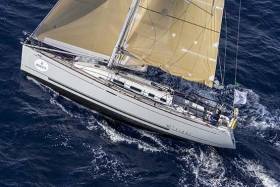Displaying items by tag: JPK
Brittany Sailing Scene & Spi Ouest Regatta a Big Hit for Dun Laoghaire Sailor in New JPK 10.30
Dun Laoghaire Harbour sailor Justin Burke was racing in the IRC B division of last weekend's postponed Spi Ouest Regatta and received a warm welcome in Brittany.
Burke of the National Yacht Club, a champion SB20 and Flying Fifteen sailor, recently acquired a JPK 10.30 and used Spi Ouest as a shakedown on the new boat, including its short-handed options.
"I'm very taken by Brittany. Beautiful scenery, lovely food and a great attitude to sailing. The weather helps a lot, but above all the people. We have met a lot of like-minded locals".
Burke says the emphasis is very much on sailing rather than the bar afterwards and was somewhat surprised to come across quite a lot of older boats, including an old Shamrock. All the vintage boats were well kitted out with new sails and all "slickly sailed", he says.
Burke's plan is to return to France, (where there are reasonably priced flights to Nantes from Ireland) and race Spi Ouest regatta again in the Spring of 2022. He'll decide then if he leaves his new boat 'Das Boot' in Brittany or brings her home to Dun Laoghaire.
He told Afloat, "there's great energy and a lot is going on in Brittany". He has been invited to join a local training session for short-handed sailing.
More on Spi Ouest regatta here
ISORA Adds Double–Handed Class to 2016 Offshore Series
The Irish Sea Offshore Racing Association (ISORA) has introduced short handed sailing to the Irish Sea offshore game this season, a recognition for the Irish boats acheiving success in the discipline on the international stage over the last few seasons.
Although ISORA has always encouraged short-handed racing (it accommodates single handed racing in its day races) the 2016 initative from Commodore Peter Ryan goes a step further with the new double handed class open to any boat sailed double handed for any of the ISORA races.
Reflecting the drive of the individual for the love of offshore sailing and noting Irish short–handed wins in the 2015 Middle Sea Race and the Round Britain and Ireland Race two years ago, it will be ineresting to see the take up for the new class on either side of the Irish Sea.
The Double Handed Overall Class winner will be determined by the best four Double Handed results for that boat. Race prizes for Double Handed will be allocated depending on the number of boats taking part in the race. Double Handed boats will also qualify for the normal Overall and Class prizes.
The first race in the Avery Crest ISORA Offshore Series 2016 takes place on the 23rd April with the day race from Dun Laoghaire to Wicklow.
As the first race of the season it is anticipated that the selected course will allow boats and crew to ease into the 2016 season while having enough time after the race to sample the hospitality of Wicklow Sailing Club while waiting for the north going tide.
The second race of the Offshore Series 2016 is the Pwllheli Bay Day Race also on 23rd April. This race will take the fleet along the scenic Welsh Coastline and out into the spectacular and World renowned sailing waters of Cardigan Bay. After racing the crews will retire to the new Sailing Club in the iconic Academy where there will be opportunities to discuss the 2016 offshore campaigns and the challenge to retain the ISORA Team Trophy again this year.
This sailing season’s highlight is the Volvo Round Ireland Race and it is hoped that this will encourage those boats taking part to gain the required experience and practice in offshore racing by taking part in ISORA.
As Afloat previously reported, this season sees some new boats entering: Kuba Szymanski’s First 40.7. Grant Kinsman’s Sigma 400 and Robert Floate’s Sydney 36 should make some competitive racing for the Class 1. George Sisk’s, ICRA 2015 Boat of the Year and overall winner of the Volvo Dun Laoghaire Regatta, “WOW” is back racing in ISORA. There are persistent rumours of a JPK 10.8 appearing and a J105 from Wales?





























































